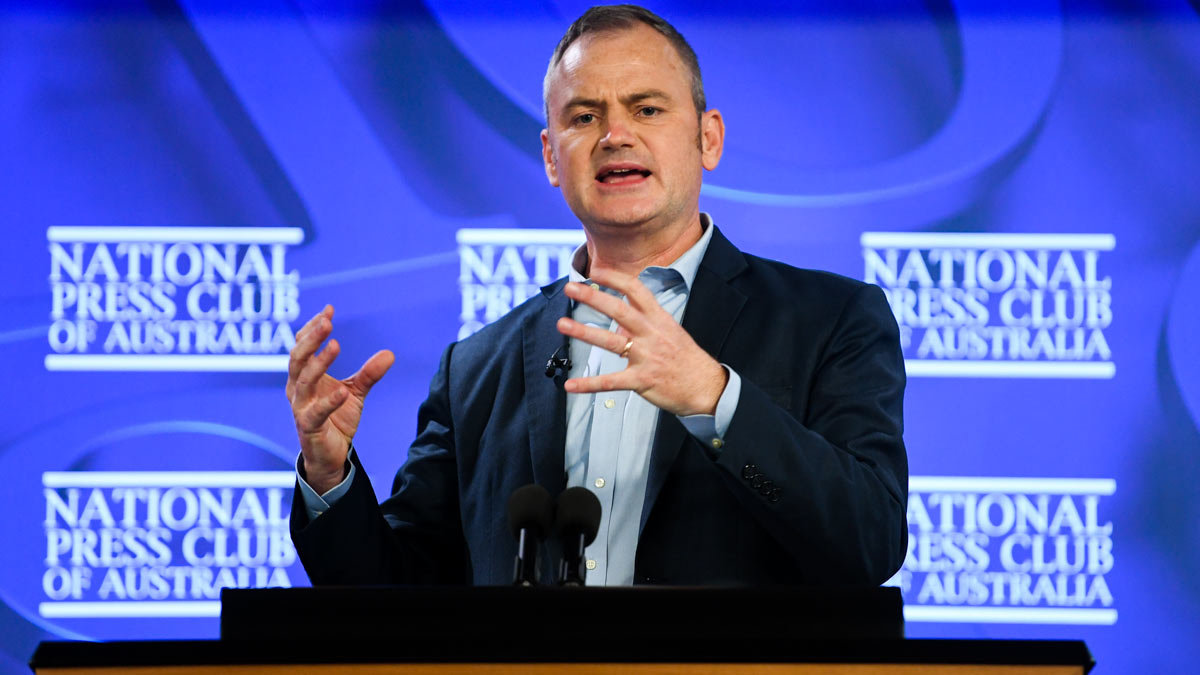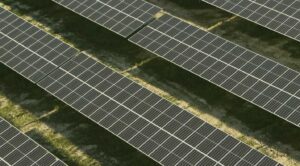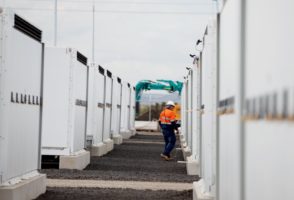The emergence of a movement of ‘climate independents’ lining up to contest the forthcoming federal election could “fix Australia”, according to Climate 200 funder and founder Simon Holmes à Court.
Holmes à Court addressed the National Press Club on Wednesday, detailing the motivations of the Climate 200 fundraising body he founded and what he hopes it can achieve by backing climate-friendly independent candidates.
“Climate 200 is not a party in any way. We don’t start campaigns. We don’t choose candidates. We don’t dictate policies. We don’t speak for any independent candidate. They speak for themselves. We simply give them a leg up with funding and support,” Holmes à Court told the National Press Club.
Holmes à Court, who convenes the Climate 200 funding body and who has been an active investor in the clean energy sector, said the independents movement had the potential to “fix Australia” and overcome a political system that had been “rigged” to the benefit of the major political parties.
“We’re so lucky to live in Australia, to be here with so much potential and opportunity at our fingertips. So, let’s fix Australia. Let’s fix our democracy by getting more ordinary, extraordinary, and honest people in there,” Holmes à Court said.
The rise of the ‘climate independents movement’, Holmes à Court said, was the result of growing dissatisfaction amongst voters with the failure of major parties to address the issues they see are a priority.
“Australians are generally a positive people, yet engaged Australians are deeply frustrated that we’re not making progress on the issues that matter,” Holmes à Court said.
“We are frustrated that so often our government is found to be either lying or incompetent and sometimes both. We have a government more interested in winning elections than improving our great nation.”
“We are frustrated about climate inaction. We are frustrated about corruption in politics, and we are frustrated about the treatment and safety of women.”
The Climate 200 fundraising body has raised more than $7 million in funds from around 8,000 donors and is contributing funds to the election campaigns of dozens of independent candidates.
If successful, the movement could see a significant boost to the number of independents on the federal parliament – including the prospect that independents could have the power to decide which party forms the next government.
Holmes à Court said it would be the responsibility of any elected independents to undertake negotiations with the major parties around policies and would not be drawn into saying whether Climate 200 had a preference.
Holmes à Court said Climate 200 provided financial support to independent candidates that committed to three key policy areas, including a science-based approach to climate change, ending corruption in politics, and progress on gender equity and improving safety for women.
While the Climate 200 funding was backing independents with particular policy commitments, Holmes à Court stressed that neither he nor Climate 200 had any influence over how the candidates may operate if successfully elected.
“My personal opinion doesn’t matter here because I won’t be in parliament, and I won’t be in any negotiation room. This is a decision for the independents,” Holmes à Court said.
“I am not the leader of this movement. I am but one small part of a movement of 8,000 people who are helping to fund candidates and to level the playing field against the party machines in about 20 seats around the country.”
Holmes à Court said the ‘climate independents’ movement was the product of grassroots community organising, with local community groups looking to replicate the successes of elected independents like Cathy McGowan, Helen Haines and Zali Steggall.
“Cathy McGowan said recently that nobody really knows the true depth and breadth of the movement. It is growing quickly, bubbling both above and below the surface,” Holmes à Court said.
“Viable campaigns are popping up in many of these communities, and it’s estimated that there are currently 10,000 actively engaged volunteers.”
“This is a spontaneous, autonomous and entirely individual set of responses across the country to community dissatisfaction with politics as usual.”
Holmes à Court downplayed the significance of a finding of the Australian Electoral Commission that independent MP Zali Steggall had not properly disclosed a $100,000 donation from the family trust of coal industry investor John Kinghorn.
“This is an issue that was identified more than a year ago and resolved the complete satisfaction of the AEC,” Holmes à Court said.
“But as for Climate 200, we are scrupulous in our compliance with all of the regulations. We go above and beyond. The vast majority of our donors are on our website.”
The donor list on the Climate 200 website details the substantial list of contributors to the fundraising body, which includes Holmes à Court himself, television presenter Julia Zemiro, former Labor minister Barry Jones, former independent MP Rob Oakeshott and former Democrats leader Meg Lees. The group has also previously received a $50,000 donation from Atlassian co-founder Mike Cannon-Brookes.








